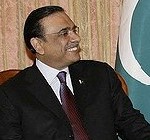Analysts often portray the central political drama in Pakistan as a morality play between the “evil” military and “good” civilians. In so doing, they leap to the conclusion that Pakistan will undoubtedly benefit if the balance of power tips in the civilians’ favour.
In this debate, I have presented evidence of the waning power of the military, but I have also argued that the trend is disruptive; that is, it has the potential to benefit a wide array of civilian forces, some committed to democracy, others to civilian authoritarianism, and still others to criminality and violence. To decide whether the rising power of Pakistan’s civilians will be a net force for good, we must also ask which civilians stand to gain most and how they intend to use their newfound power.
The return of Pakistan’s elected civilian democrats in 2008 replaced nearly a decade of military control over the vast majority of the state’s administrative functions. Pakistan’s upcoming national election should be celebrated because civilians will have another opportunity to demonstrate the tangible benefits of representative, democratic governance to an increasingly sceptical Pakistani audience. Of course, if the next crop of civilian leaders fails to deliver on this high-stakes moment—if Pakistan suffers years more of energy shortages, corruption scandals, and economic underperformance—then the principal threat to the stability of Pakistan’s democratic system will be the weakness of the civilian politicians themselves.
Similarly, Pakistan’s media and judiciary are civilian institutions with a great deal more power than in prior decades, but also a mixed record as political forces. True, the media suffers from military intimidation, but that is not the only reason for its weaknesses. The vast majority of Pakistan’s journalists are underpaid and inadequately trained. Their loyalties are too easily purchased by both military and civilian meddlers with deep pockets, resulting in inadequate investigative reporting and a coarsening of the public debate. Pakistan’s judges and lawyers are properly praised for their unprecedented “independence,” yet they too often show ugly signs of bias and intolerance sharply at odds with liberal sensibilities.
Pakistan’s civil society is Janus-faced as well. Every day, new groups of idealistic Pakistanis work together to improve the lot of the nation’s downtrodden. But their efforts are frequently matched by violent extremists bent on destroying communities and lives. All are civilians, and all are increasingly able to organise, communicate, and act outside the military’s control.
None of this is an argument in favour of restoring military power in Pakistani society or an apology for the strategic shortsightedness of Pakistan’s generals that gave birth and sustenance to militants and terrorists. It is, however, an argument for appreciating that Pakistan’s civilians—the government, media, judiciary, and civil society—have had a mixed record as the balance of power tilted in their favor.
Pakistan’s elections loom. The question for civilian leaders is not simply whether they can stave off military rule, but if they can find a way to put their country on a decidedly better path for the future.
Daniel Markey is Senior Fellow for India, Pakistan and South Asia at the Council on Foreign Relations.
This is part of Gateway House’s online debate, titled ‘The civil-military equation in Pakistan has begun to tilt in favour of civilians.’ Read more on the debate, here.
Has the civil-military equation in Pakistan has begun to tilt in favour of civilians? Send us your comments or feedback to info@gatewayhouse.in or call us on +91 22 22023371.
This article was exclusively written for Gateway House: Indian Council on Global Relations. You can read more exclusive content here.
For interview requests with the author, or for permission to republish, please contact outreach@gatewayhouse.in.
© Copyright 2013 Gateway House: Indian Council on Global Relations. All rights reserved. Any unauthorized copying or reproduction is strictly prohibited.


